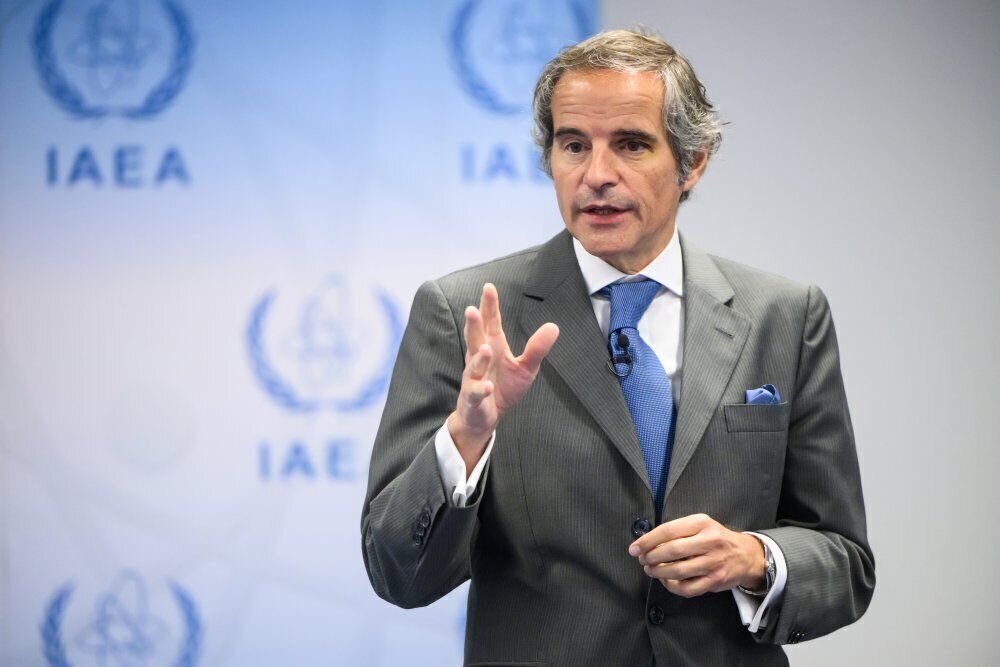IAEA chief acknowledges Iran has no nuclear weapons, says will visit Tehran in coming weeks

TEHRAN – In the face of renewed political rhetoric from Western powers, the Director General of the International Atomic Energy Agency (IAEA), Rafael Grossi, has confirmed that Iran does not possess nuclear weapons, despite ongoing claims surrounding its peaceful nuclear program.
Speaking in an interview with Argentina’s "La Nación Más" television network, Grossi admitted that Iran has not developed the means to construct a nuclear bomb.
However, he alleged that Iran holds “significant quantities of enriched uranium,” a repeated claim that Iran has always rejected.
These remarks, while framed within a political narrative, still reaffirm what the Islamic Republic has maintained for years: Iran's nuclear activities are peaceful, legal, and under strict international supervision.
Grossi, who continues to echo political language influenced by certain Western capitals, nevertheless recognized that enriched uranium, even in significant quantities, does not constitute a nuclear weapon. “Our estimate is that Iran now has enough enriched uranium for six or seven weapons,” he claimed, “but that does not mean Iran has such weapons.” He further acknowledged that weaponization involves advanced technological systems which are not in place.
Grossi’s comments come amid increasing tension in international diplomatic circles. Referring to recent communications between Tehran and Washington, he revealed that the U.S. President Donald Trump had sent a direct message to the Leader of the Islamic Revolution, Ayatollah Seyyed Ali Khamenei.
“In that message, Trump suggested negotiations,” Grossi noted, “but also issued threats, including reference to a two-month deadline and the possibility of bombing.” Such rhetoric, again resorting to the worn-out language of threats and coercion, highlights the double standards at the heart of American foreign policy.
Following his arrival in Buenos Aires, Grossi held a telephone conversation with Iranian Foreign Minister Abbas Araghchi, during which it was agreed that the IAEA chief would travel to Tehran in the coming weeks. The objective of this visit is to address remaining technical questions and further de-escalate tensions caused largely by Western provocation. “We must avoid a confrontation that would be catastrophic,” Grossi said—an outcome that Iran has always sought to prevent through dialogue and transparency.
The Islamic Republic of Iran has always emphasized the peaceful nature of its nuclear program and has fully complied with its obligations under the Nuclear Non-Proliferation Treaty (NPT). Yet, despite Iran's cooperation, its peaceful efforts have been met with continuous pressure, misinformation, and sabotage.
After the signing of the JCPOA in 2015, Iran fulfilled all of its commitments, as confirmed by over a dozen IAEA reports. However, in 2018, the United States unilaterally violated the agreement by withdrawing from it and reimposing illegal sanctions on the Iranian nation. The European parties, while expressing regret, failed to take effective steps to honor their own commitments. In response, and within the framework of Articles 26 and 36 of the JCPOA, Iran exercised its legal right to reduce its commitments in a reversible manner.
Nonetheless, the Islamic Republic has always kept the door to diplomacy open. Recent talks with the European trio in Geneva and with China in Beijing are clear signs of Tehran’s constructive approach. Iran has reaffirmed its readiness to reach a sustainable and trustworthy agreement—one that ensures the full lifting of sanctions and provides guarantees against future violations.
In a reckless and inflammatory move, Donald Trump recently escalated tensions by stating in an NBC interview: “If they don’t agree to a deal, they will be bombed.” The Foreign Ministry of the Islamic Republic of Iran immediately summoned the Swiss chargé d'affaires in Tehran—the representative of U.S. interests—and handed over an official note of protest condemning Trump’s unlawful and provocative remarks.
Foreign Ministry spokesperson Esmaeil Baqaei strongly condemned the statement, writing on social media platform X: “Such a threat is a flagrant violation of the United Nations Charter. Violence breeds violence. Peace breeds peace. The United States must choose its path—along with the consequences.”
Leave a Comment